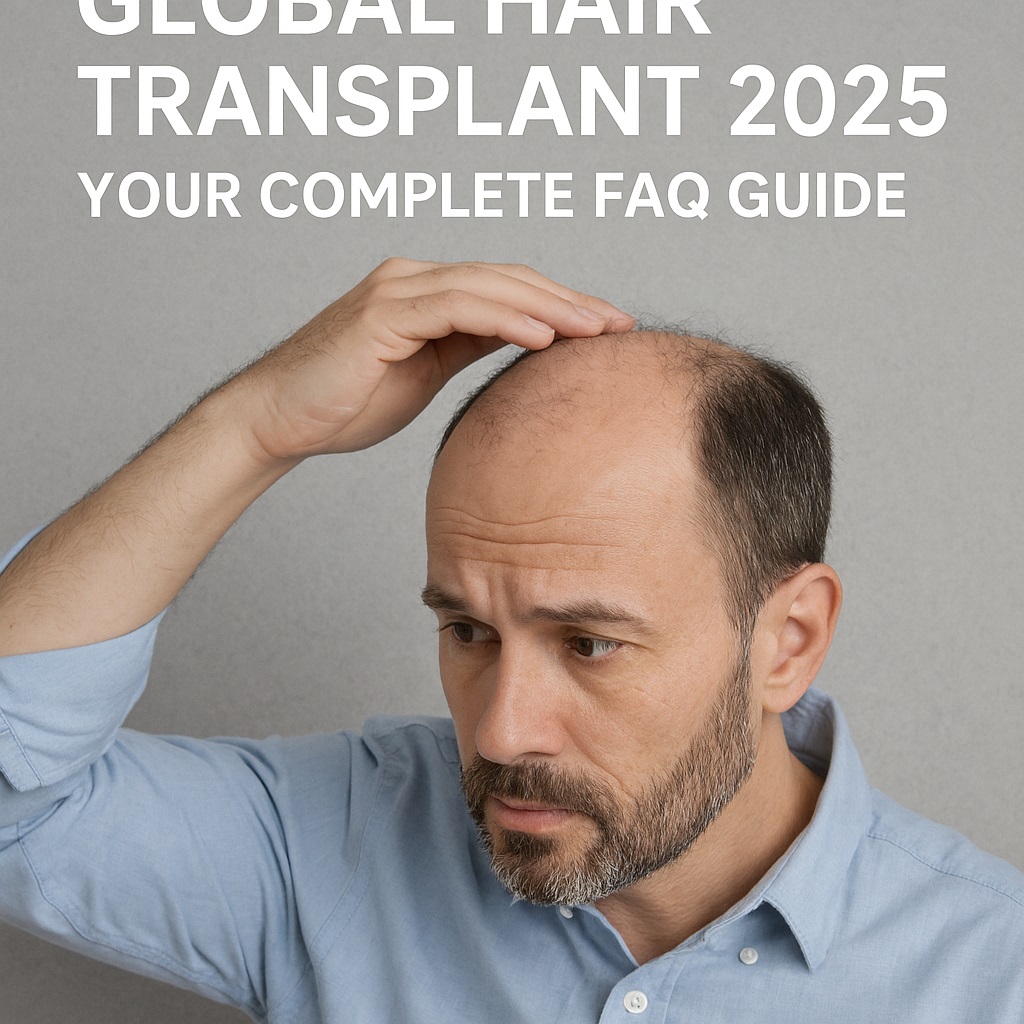Global Hair Transplant 2025: Your Complete FAQ Guide
Considering a **global hair transplant in 2025**? It’s a significant decision, and naturally, you have questions. For that reason, this guide is your definitive resource, answering everything you need to know about hair transplants globally. We’ll explore the latest techniques, costs, and recovery timelines to ensure you feel confident and prepared. Ultimately, choosing to restore your hair can dramatically improve your confidence and quality of life. This guide will help you navigate the process, from understanding the different types of procedures to selecting the right clinic. Consequently, you can make an informed choice for your future. This is particularly important for anyone considering a **hair restoration abroad** in 2025.
Book Your Free Consultation Today at WMedTour!
What’s New in Hair Transplants for 2025?
The field of hair restoration is constantly evolving, and 2025 is no exception. Furthermore, we are seeing significant advancements in automation and precision. For instance, robotic systems are becoming more sophisticated, offering unparalleled accuracy in graft extraction. Also, new techniques are emerging that focus on minimizing scarring and reducing recovery time, making the procedure more accessible and less invasive than ever before. If you are researching an **international hair transplant**, these advancements are key to a successful outcome. Moreover, patient-centric care is a major trend. Clinics are increasingly providing comprehensive, personalized treatment plans that include post-operative care and nutritional guidance. In addition, advancements in regenerative medicine, such as enriched platelet therapies, are being integrated to boost follicle health and improve overall results.
FUE vs. DHI: Which is Right for You?
Deciding between Follicular Unit Extraction (FUE) and Direct Hair Implantation (DHI) is a common dilemma. Both are excellent choices, but they work differently. FUE involves extracting individual follicles and then manually implanting them into small incisions. Conversely, DHI uses a specialized tool called a Choi pen to extract and implant grafts simultaneously. In short, this eliminates the need for pre-made channels.
Therefore, DHI often provides a higher density and a faster implantation process. However, FUE is still the more widely used technique, particularly for larger areas. Your doctor will ultimately recommend the best method based on your specific hair loss pattern and donor area. Meanwhile, let’s compare them in a table to highlight the key differences. This decision is crucial for anyone planning their **global hair transplant 2025** journey.
| Feature | FUE (Follicular Unit Extraction) | DHI (Direct Hair Implantation) |
|---|---|---|
| Implantation Method | Creates channels first, then implants grafts. | Simultaneous extraction and implantation with a Choi pen. |
| Density | Very good, but can vary. | Potentially higher density and control. |
| Scarring | Minimal, tiny dots. | Practically no visible scarring. |
| Healing Time | Typically 7-10 days for scabs to fall. | Slightly faster recovery. |
| Hair Shaving | Usually requires shaving the entire head. | Often allows for partial shaving or no shaving. |
How to Prepare for Your Hair Transplant
Proper preparation is crucial for a successful hair transplant. First, you must consult with a qualified specialist to assess your eligibility and create a personalized plan. Following that, you will receive detailed pre-operative instructions.
Essentially, preparation involves several key steps. For example, you may need to avoid certain medications, like aspirin, to prevent bleeding. Similarly, you should stop smoking and consuming alcohol, as these can affect blood flow and slow down the healing process. Finally, you should arrange for a comfortable post-op period, which includes transportation and a place to rest. This preparation is a vital part of any **global hair transplant 2025** plan.
FAQs: Everything You Need to Know About Hair Transplants
Here are a number of the most important questions about hair transplantation, with clear, authoritative answers. For instance, we cover everything from the basic science to advanced techniques. In addition, we touch upon recovery, cost, and long-term care.
What is the best age for a hair transplant?
The ideal age for a hair transplant is generally from 25 to 65. Surgeons usually advise against the procedure for patients under 25, mainly because their hair loss pattern may not be fully established yet. Waiting ensures that the surgeon can achieve a more stable and permanent result. Nevertheless, an experienced surgeon will assess each case individually.
How long does a hair transplant procedure take?
Typically, a hair transplant procedure takes between 6 to 8 hours. The duration can vary, however, depending on the number of grafts and the chosen technique (FUE or DHI). For example, a larger session may require more time. Rest assured, your comfort is a priority, and breaks are scheduled throughout the day.
Is a hair transplant a painful procedure?
A hair transplant is performed under local anesthesia, so you will not feel any pain during the procedure. Patients often report feeling a slight pressure or discomfort at the injection sites. Afterward, any mild pain or soreness can be managed effectively with the prescribed painkillers.
What are the main causes of hair loss?
The most common cause of hair loss is androgenetic alopecia, which is a genetic condition. However, hair loss can also be caused by hormonal changes, stress, nutritional deficiencies, and certain medical conditions or medications. A detailed list of causes is provided by the American Academy of Dermatology.
How much does a hair transplant cost in 2025?
The cost of a hair transplant varies greatly depending on the country, the clinic’s reputation, the surgeon’s experience, and the number of grafts needed. For example, a procedure in Turkey is often significantly more affordable than in the United States or the UK, mainly due to lower operational costs. For a precise quote, it is best to get a personalized consultation. Contact WMedTour for a detailed, no-obligation quote tailored to your needs.
How long is the recovery period after a hair transplant?
The initial recovery period is about 10-14 days, during which the scabs fall off and the redness subsides. For this reason, many patients can return to work within a week. The transplanted hair will then shed, and new hair growth will begin around 3-4 months post-op. Full results are typically visible after 12-18 months.
Can I exercise after my hair transplant?
You should avoid strenuous exercise for at least two weeks following your hair transplant. Perspiration and increased blood pressure can harm the new grafts. Light walking is generally fine after a few days, but always follow your surgeon’s specific instructions.
What is the “Shock Loss” phenomenon?
“Shock Loss” is a temporary shedding of both transplanted and existing hairs that can occur a few weeks after the procedure. It is a normal part of the healing process and is not a cause for concern. The shed hairs will regrow after a couple of months.
Are the results of a hair transplant permanent?
Yes, the results of a hair transplant are considered permanent. The transplanted follicles are taken from the donor area (usually the back of the head), which is genetically resistant to the hormone that causes baldness. Therefore, these follicles will continue to grow for a lifetime in their new location. The International Society of Hair Restoration Surgery also confirms this permanence.
What are the risks and side effects of a hair transplant?
As with any surgical procedure, there are minor risks, including swelling, mild pain, and numbness. However, serious complications are extremely rare, especially when the procedure is performed by a certified surgeon in a sterile environment. You will receive a list of potential side effects during your consultation.
Can women get a hair transplant?
Absolutely. While male pattern baldness is more common, women are also excellent candidates for hair transplants, particularly those with a stable donor area and well-defined areas of hair loss. Consultations with specialists are crucial to determine the cause of hair loss and the best treatment plan.
Is a hair transplant considered major surgery?
A hair transplant is a minor surgical procedure. It is minimally invasive and performed on an outpatient basis. You will be awake and comfortable throughout the process, and you can usually return to your hotel the same day.
How many grafts will I need?
The number of grafts you need depends on your level of hair loss and the density you want to achieve. A professional will use a scale (like the Norwood scale) to assess your specific situation and recommend an appropriate number of grafts. This is why a personalized consultation is so important.
Are there non-surgical alternatives to a hair transplant?
Yes, several non-surgical treatments can help manage hair loss, including medications like Minoxidil and Finasteride, as well as therapies such as PRP (Platelet-Rich Plasma). These can be used alone or in conjunction with a hair transplant. Medical News Today provides an overview of some of these alternatives.
Can I get a transplant if I have gray hair?
Yes, you can. The color of your hair, whether it is black, brown, or gray, does not affect the success of the transplant. In fact, gray hair can sometimes provide a softer, more natural look depending on the person.
Will the transplanted hair look natural?
When performed by a skilled surgeon, the results are incredibly natural. Modern techniques focus on mimicking natural hair growth patterns, including angle, direction, and density. To clarify, the final result should be undetectable to the naked eye.
How do I choose the right clinic and surgeon?
Choosing a clinic requires careful research. Specifically, you should look for a clinic with certified surgeons, a strong portfolio of before-and-after photos, and positive patient reviews. Furthermore, ensure the clinic provides a comprehensive package that includes accommodation and transfers for a seamless experience. Discover the expert team at WMedTour and read our patient stories.
What is the role of post-op care?
Post-operative care is just as vital as the surgery itself. It includes carefully washing your hair, protecting the new grafts from sun exposure, and following all medication schedules. Consequently, diligent aftercare helps ensure the survival of the transplanted follicles and promotes healthy, robust hair growth.
Can I wear a hat after a hair transplant?
You should avoid wearing a tight hat for the first 10-14 days to prevent damage to the new grafts. A loose-fitting cap may be permissible after the first week, but always check with your surgeon.
How do I know if I’m a good candidate for a hair transplant?
Generally, you are a good candidate if you have a sufficient donor area, are in good overall health, and have realistic expectations about the results. A thorough consultation is the only way to be certain.
Why Choose WMedTour for Your 2025 Hair Transplant?
When you’re considering a **hair restoration abroad**, choosing the right provider is perhaps the most important decision you can make. At WMedTour, we understand this completely. Therefore, we have meticulously built our services around providing an unmatched experience. We focus on combining world-class medical expertise with comprehensive, patient-centric care. Our packages are designed to take the stress out of the process, leaving you to focus on your journey to a new you. Additionally, our team of expert surgeons uses the latest **global hair transplant 2025** techniques to ensure natural and lasting results. Furthermore, our state-of-the-art facilities guarantee your safety and comfort throughout your stay. For these reasons, choosing WMedTour means choosing excellence and peace of mind.
Ready for a Change? Get Your Free Consultation Now!




